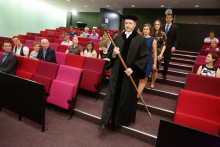'Ius promovendi'
From 2017, a change in legislation granted all assistant and associate professors in the Netherlands the right to act as formal supervisor of PhD students. In the Netherlands, an assistant professor is referred to as ‘universitair docent’ (UD) and an associate professor as ‘universitair hoofddocent’ (UHD). Until 2017, this right, also known as the ius promovendi, was reserved for full professors (hoogleraren). The change in the law led to different policies at Dutch universities: some universities granted the ius promovendi to practically all scientific staff members, while other institutions restricted the right to a few experienced uhd'ers (associate professors).
The UT opted for a limited extension of the right to supervise doctoral candidates in 2018. A number of associate professors in the highest category (UHD1) were granted the ius promovendi. Also, strict requirements are attached to the extension, such as having one's own line of research, at least three completed co-promotions and at least two honoured research proposals of a minimum of 250,000 euros. Ultimately, the UT Doctorate Board, which includes the deans and the rector, decides who gets the right.
Young Academy Twente (YAT), a community of young academics set up, similar to the national Young Academy (De Jonge Akademie), wants to change the current criteria for granting the ius promovendi and presented an advice on this to the Doctorate Board earlier this year. The current criteria are not in line with national legislation, argues Derya Demirtas. She is a YAT member and associate professor at the UT (without ius promovendi). 'The law in the Netherlands makes it possible to give all UD'ers and UHD'ers the ius promovendi. This is already the case at some Dutch universities, but not yet at the UT. This leads to a lack of recognition and independence.'
Lack of reward
Every PhD student needs a promotor. In the current system at the UT, however, this right is reserved for full professors (hoogleraren) and a select group of associate professors. In addition, there usually is at least one co-promotor, who in practice acts as daily supervisor. This position is normally filled by assistant or associate professors. According to Young Academy Twente, this is precisely where the core of the problem lies: in the UT regulations the co-promotor’s role is defined as ‘assist the promotor on request in supervising the doctoral candidate’. Yet, the co-promotor is often the one who carries out most of the work in the supervision process, the Young Academy Twente researchers argue.
'If everyone wears Harry Potter-like costumes at a PhD ceremony, and the UD or UHD is the only one who does not, it makes the co-promotor look unprofessional'
Despite all the efforts of the co-promotor, the name of the first promoter ends up adorning on the front of the dissertation. The current rules thus take away the reward for scientific staff members without the ius promovendi, Demirtas argues. Dominik Krug, associate professor at the UT, also criticises the lack of recognition within the current system. He mentions the PhD ceremony as a telling example. 'During a ceremony, everyone wears a toga, except me, because I do not have the ius promovendi. This makes me seem like an imposter, not the real deal, even though I did almost all the work.'
David Fernández Rivas, adjunct professor at the UT, agrees. He holds the right to confer a doctorate, but also advocates extending the ius promovendi at the UT. 'It is about perception. If everyone wears Harry Potter-like costumes at a PhD ceremony, and the UD or UHD is the only one who does not, it makes the co-promotor look unprofessional. I would say: either everyone wears a gown, or no one does.'
Confusion
At the same time, the researchers stress that the toga situation is ‘annoying’ at best. There are other issues that require greater attention. Rivas, for instance, points out the differences with the international system. 'The Dutch terminology is just terrible’, he says. In most countries, any person with a PhD who teaches and does research at a university is given the title of professor, and with it the right to act as formal supervisor of PhD students. For example, the 'universitair docent (ud)' is internationally regarded as an assistant professor and the 'universitair hoofddocent (uhd) as an associate professor. 'If I came to the UT as a foreign researcher with the title assistant professor, I would lose my right to confer a doctorate,' Demirtas says. 'This is a huge disadvantage of working at the UT. This is bad for the international competitiveness of our university.'
'This system creates unnecessary dependency and thus possible conflicts'
Independence
According to Demirtas, there is another major disadvantage. The current system affects the independence of researchers without the ius promovendi. 'Suppose a young researcher receives an ERC Starting Grant. This researcher has written the proposal and done all the work. But when PhD students are subsequently appointed, a first promotor has to be involved. This is open to abuse. In theory, this promotor can start steering the course of the research. In other words, the UT does not give trust to scientists without the ius promovendi.’
Krug agrees. 'The European research funder provides the money because of my expertise. They trust me with the research money. This is in contrast to the UT policy, which is based on mistrust. I honestly find it personally offensive.' Demirtas, Krug and Rivas stress that most UT professors give space to researchers without the ius promovendi to set their own course of research. 'But the system creates unnecessary dependency and thus possible conflicts, especially if there is already a toxic environment in a research group.'
Politics
The three UT researchers envisage a system where the selection of supervisors revolves solely around professional expertise. 'We are not against the 'four-eye principle' of a first supervisor and co-supervisor. But the assignment should be based on merit rather than ranking,' says Demirtas. 'At other universities with a more generous ius promovendi, the results are positive. Young researchers often have more time for supervision than full professors. Moreover, their specific expertise is often better suited to the PhD's research topic. That only benefits the quality of supervision.'
'A majority supports our proposal, but a few deans are holding it back'
All in all, plenty of reasons for extending the rights, the Young Academy Twente researchers believe. The rejection of the advice from YAT by the UT Doctorate Board therefore caused surprise. 'I spoke to several full professors and none of them thought the extension of the ius promovendi was a bad idea,' Krug says. 'I haven't heard any valid counter-argument yet.' Demirtas: 'It's politics. There are no reasonable arguments to keep the current system.'
According to the researchers, the current system is nothing but 'gatekeeping'. ‘It is unclear what interests they are actually protecting,' Rivas states. 'A majority supports our proposal, but a few deans are holding it back. We would like to see an open debate on this at the university.'
'Ensuring quality'
According to rector Tom Veldkamp, chairman of the Doctorate Board, 'gatekeeping' is not in question. The reason for not expanding the ius promovendi for the time being has to do with ensuring quality, the rector says. 'Supervising PhD students is a difficult process that requires experience. Every university in the Netherlands has its own rules for this. At the UT, we choose to grant the ius promovendi to researchers with considerable experience in supervising PhDs in their careers. This moment often coincides with the step to the UHD1 position.'
'Scoring with a project is really different from supervising a PhD student in a good way'
In principle, Veldkamp is not opposed to extending the right to act as formal supervisor of PhD students. 'I am not against the ius promovendi for UDs or UHDs, but we are struggling with quality assurances. If we grant the ius promvendi earlier, I foresee trouble. A supervisor guards the interest of the PhD student and leads the process. You need experience for that. If things go wrong, it has a huge impact on a PhD.' Even young researchers who obtain a major grant still lack this experience, the rector argues. 'Scoring with a project is really different from supervising a PhD student in a good way.'
At the same time, Veldkamp understands the call for more recognition. 'Maybe we should do it in a different way. Nowadays, you often see an additional explanatory note with authorship, stating who did what. We could think of something similar for supervising PhD students.' He also understands the uncomfortable situations during PhD ceremonies, where daily supervisors are not allowed to wear a gown. 'I understand the feelings. Moreover, it is not consistent in the Netherlands. Sometimes the ius promovendi is acknowledged by your own university, but you're not a worthy member of the examining committee at another university. Therefore, I advocated making one consistent policy in the Netherlands.'
Basic qualification
According to Veldkamp, a possible alternative to expanding the ius promovendi at the UT is a so-called 'basic qualification in PhD supervision', in which researchers are trained to supervise PhD students. This basic qualification could also apply to UDs and UHDs, meaning an extension of the ius promovendi for those who achieve the basic qualification. 'I wouldn't be against that at all.’
Until then, the UT will stick to current standards, Veldkamp says. According to the rector, the answer also lies largely in a more egalitarian academic landscape, where researchers function as a team. 'If a young researcher has written a proposal, it shouldn't be the case that a full professor completely overturns everything. It should be a team decision. I think the UT is in a transitional phase in this respect. We want to move towards a different way of working together.'







